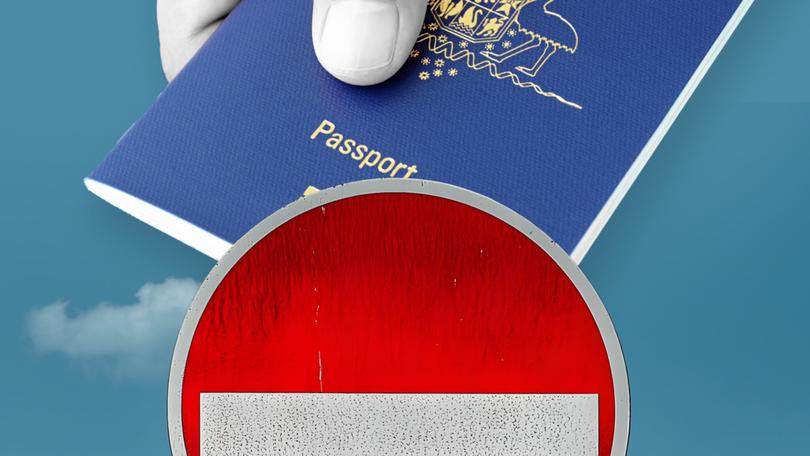Federal election 2025: Stranded Aussies issue resurfaces on the election trail
Anthony Albanese has told a public forum that he would not want to see Australians locked out of the country ever again after the border closures of the pandemic.

Prime Minister Anthony Albanese has made the surprising decision to revisit the harsh pandemic border closures by suggesting that he would not want to see Australians locked out of the country ever again.
He was immediately urged to put his words into action and law to protect citizens from being stranded overseas again.
Mr Albanese raised the issue — unprompted — at a forum at the Blacktown Workers Club in Western Sydney on the Federal Election campaign trail on Friday.
Sign up to The Nightly's newsletters.
Get the first look at the digital newspaper, curated daily stories and breaking headlines delivered to your inbox.
By continuing you agree to our Terms and Privacy Policy.During the pandemic, the Federal Government closed the international border, and the state premiers imposed caps on the number of hotel quarantine spaces, creating a backlog of around 40,000 citizens, or Stranded Aussies, trying to return to the country at any one time.
The former prime minister Scott Morrison also implemented a specific ban on Australians in India from returning to the country.
While answering a question about migration levels, Mr Albanese raised the issue of stranded Aussies, saying it had contributed to rising immigration once the border had reopened.
But he went further in criticising the policy.
“Remember this, during COVID, some Australians were locked out, including citizens of Australia, who were told ‘Sorry, to stay in India you can’t come home,’ by the then Government,” Mr Albanese said.
“Now, people in Western Sydney didn’t appreciate that because I had it certainly raised with me by our members.”
Asked by The Nightly at a subsequent press conference if he would commit to ensuring Australians were never locked out of the country again and that he would do everything in his power to convince State premiers against pursuing such policies, Mr Albanese said the premiers were not to blame.
“State premiers don’t control our borders; our national border is controlled by our Federal Government,” he said.
“That was a decision that was made,” he said in reference to former prime minister Scott Morrison’s decision to close the international border.
“I was concerned at the time that that occurred because there are consequences to it.
“I think the Australian passport, of course, means something.
“It means the Australian Government is on your side.”
However, Mr Albanese said he could not give a blanket commitment that Australians would always be allowed home.
“If someone who’s engaged in an act, potentially of violence, from Australia … you asked for a blanket commitment, I won’t do that,” he said.
“What I will do is put the principle position that I have have which I think is very clear.”
During the pandemic, former Labor premiers Dan Andrews, Mark McGowan and Anastascia Palaszczuk were among the fiercest supporters of locking Australian citizens out in an effort to keep COVID infections to zero.
At one point, Victorian premier, Mr Andrews said he was happy to lead a “cold, hard discussion” about restricting returning Australians to even lower levels. As Premier, he regularly refused to allow citizens to return home via Victoria and closed all quarantine spaces, shifting the burden on to other states, such as New South Wales.
Nick Coatsworth, former deputy chief medical officer during the pandemic and an infectious diseases expert, welcomed the Prime Minister’s comments but said they glossed over the role the Labor premiers played.
“It’s comforting that the Prime Minister recognises the absence of compassion with regard to returning Aussies during COVID,” Dr Coatsworth said.
“It would be helpful if he equally acknowledged the notable absence of compassion of premiers Andrews, Palaszcuk and McGowan in their disease control policies.
“Going forward, compassionate disease control should be the founding principle of the new Australian Centres for Disease Control, a key Albanese government initiative.”
Ed Cavanough from the progressive think tank McKell Institute also urged Mr Albanese to put his words into action.
“All Australian citizens should always have the right to return to their home country, no matter the circumstances,” he said.
“The pandemic-era rhetoric that led to Australians being abandoned abroad was in denial of Australia’s modern, globally-connected, multicultural population.
“Indian-Australians left stranded in India during the pandemic experienced state-imposed statelessness, as their return to Australia was briefly subject to criminal sanction.
“The extraordinary powers that enabled this action should be codified out of existence.
“Any health security risk from returning Australians should always be mitigated by investments in fit-for-purpose disease control infrastructure, not by the punitive removal of basic citizenship rights.
“The right for Australians to return to their own country no matter the circumstance should be guaranteed by law, so we never see our compatriots abandoned abroad again.”
Professor Greg Dore, an infectious diseases expert at the Kirby Institute who argued that Australia had gone too far in denying citizens entry, said the balancing act in a public health crisis was always difficult. However, he said the pandemic’s extremes should not be replicated.
“Stranded Australians — both those unable to leave and those unable to return — were the casualties of our zero COVID policy,” Professor Dore said.
“Despite Australia’s impressive overall public health response, this denial of our citizens’ rights is hopefully something that will not be so easily instituted in future.
“It’s always difficult to get the public health balance right, with respect to community protection and individual rights, but it shouldn’t be forgotten how many people were affected by these policies.”

